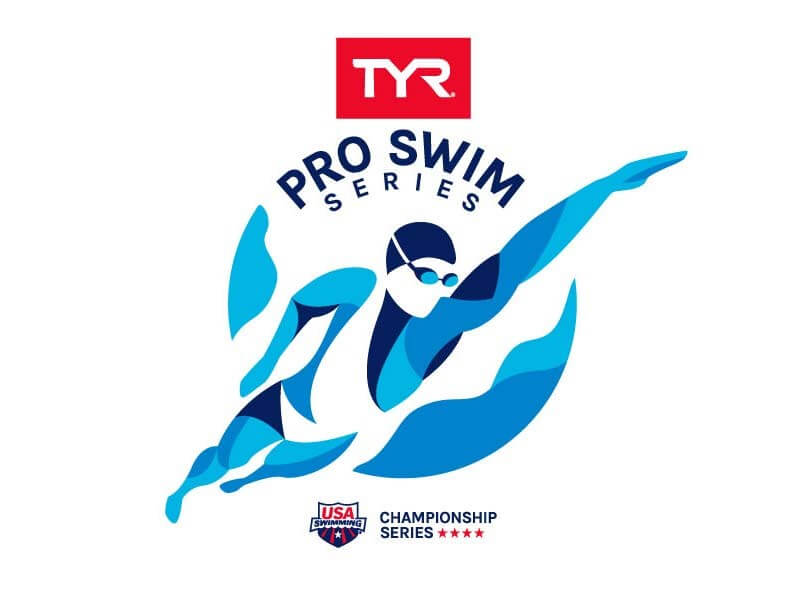TYR Pro Swim Series: What We Learned From the First Prelims/Finals Meet of the Year
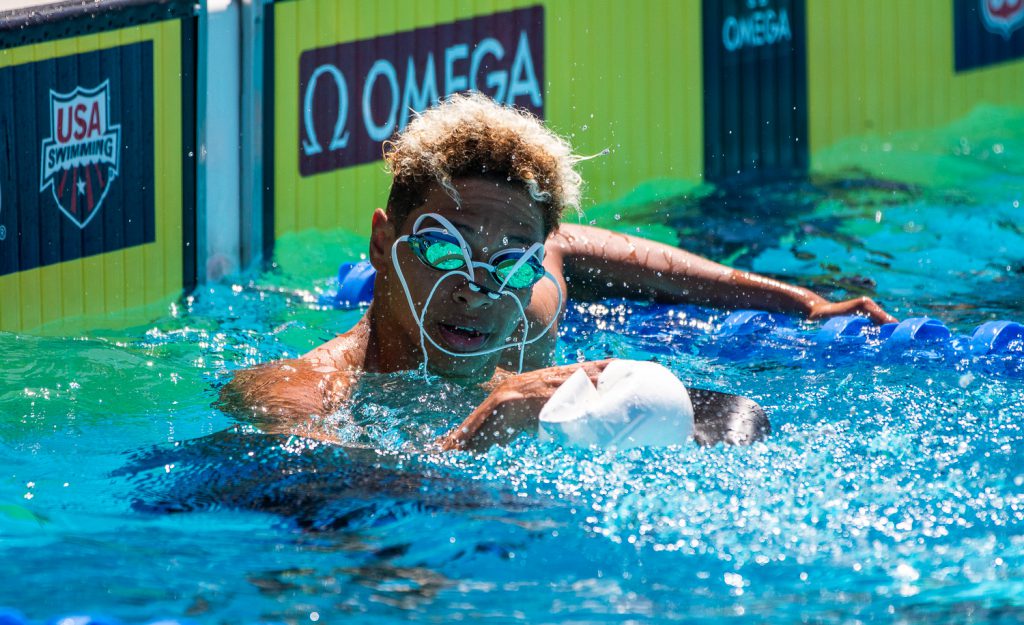
TYR Pro Swim Series: What We Learned From the First Prelims/Finals Meet of the Year
Usually a prelims/finals meet in mid-January would be another ho-hum competition in the leadup to the Olympic Trials. But this past weekend’s Pro Swim Series in San Antonio and Richmond was a welcomed sight for swim fans due to the fact it was the first legitimate prelims/finals meet in a long-course venue since March 2020, a week before the COVID-19 pandemic took hold of the United States.
USA Swimming held the U.S. Open across nine different sites in late November, but the meet was timed finals only and each race was predictable enough that you didn’t need to watch it live to see who would win. The most exciting part was seeing the compiled list to see how each swimmer stacked up against each other across the nine different sites. So with only two sites adhering to social distancing and masked wearing, this past weekend’s swimming was better than a lot of long course meets we are accustomed to seeing over the summer and autumn.
So with 145 days until the Olympic Trials in Omaha, Nebraska, what did we learn from this weekend’s TYR Pro Swim Series?
Don’t Underestimate the Teenagers
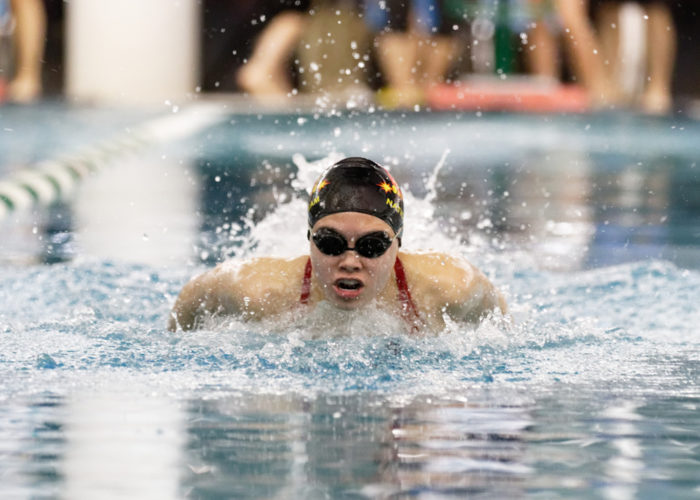
Levenia Sim made a name for herself at the TYR Pro Swim Series. Photo Courtesy: Patrick Sim
It is really no surprise that the high school swimmers performed up to standard with the professionals, since a lot of people tabbed those young guns as people that would benefit from the extra year of preparation for Olympic Trials while they are still growing and getting stronger. To have some tangible results from those teenagers this past weekend, confirms the notion that they need to be considered among the running candidates for spots in the Trials finals.
Pictured above is 14-year-old Levenia Sim, who won the 100 back in Richmond at 1:00.94. Overall, that put her fifth in that race behind Regan Smith (59.75), Olivia Smoliga (59.94), Kathleen Baker (59.97) and Isabelle Stadden (1:00.32), who all raced in San Antonio. Had she been lined up against that group of swimmers, who knows what she could have gone, but that swim this weekend put Sim on the map, as well as her older sister Letitia, who was third in the 100 breast (1:08.31) and second in the 200 breast (2:29.67).
A trio of N.C. State commits, David Curtiss, Arsenio Bustos and Aiden Hayes also showed well in Richmond this past weekend. Curtiss lit up the 50 free with a 21.87, faster than anyone across the two sites. Bustos was third overall in the 200 IM (2:01.66), ahead of some pretty good company in Jay Litherland, Andrew Seliskar and Carson Foster. Hayes won the 200 butterfly at 1:58.33, ahead of Foster and Worlds finalist Zach Harting.
All three of those guys will be freshmen at N.C. State next year, and will certainly bring some momentum into Raleigh after having a crack at their first Olympic Trials.
College Swimmers Have Not Missed a Beat
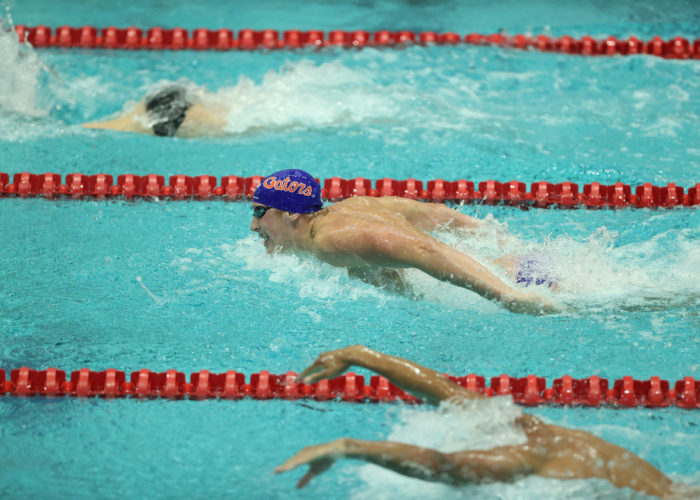
Kieran Smith performed well at the TYR Pro Swim Series. Photo Courtesy: Tony Walsh / Georgia Athletics
Juniors Kieran Smith and Shaine Casas had breakout 2019s that were supposed to culminate in the 2020 NCAAs where the IU Natatorium was to be on record watch, but alas the meet was canceled and the world would never see it come to fruition. But Casas and Smith picked up right where they left off this past weekend, starting off 2021 in the same way they entered 2020 – with high expectations.
Casas took second to Ryan Murphy in the 100 back (54.32) and 200 back (1:58.04) and also won the 100 fly (51.94). He has been on a tear in short course yards in the last few months, and he was able to translate that to long course this past weekend, establishing himself as a favorite for Olympic Trials in June.
Smith won the 200 free (1:47.36) and 400 free (3:49.37) and set a best time in the 200 IM (1:59.38), establishing himself as a top contender, albeit more quietly, for the Olympic Trials.
Catie DeLoof Quietly Beats Loaded Sprint Field
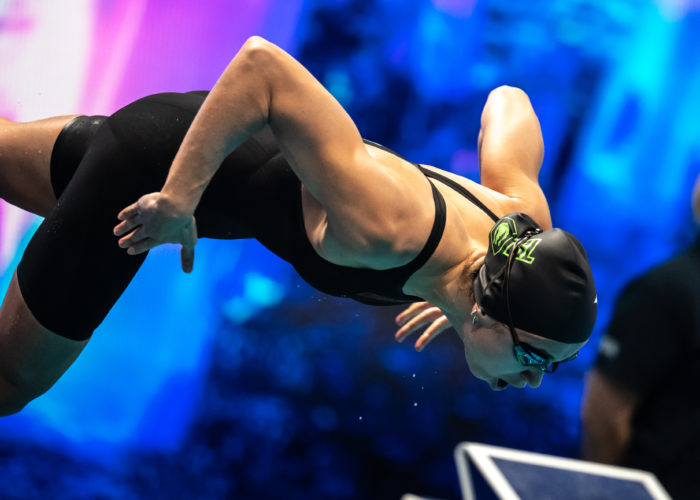
Catie DeLoof swept the sprint free events at the TYR Pro Swim Series; Photo Courtesy: MIKE LEWIS/ISL
It may have gone unnoticed but Virginia postgrad Catie DeLoof had the fastest time of the weekend in both the 50 (24.80) and 100 freestyle (54.33), beating the likes of Olympic Trials favorites Abbey Weitzeil and Olivia Smoliga. Heading into 2020, DeLoof wasn’t necessarily on a lot of people’s minds as someone that could sneak into the top six in the 100 freestyle but based on what we saw this weekend, she should definitely be considered among that group.
It is worth noting that DeLoof recently made the switch to train at the University of Virginia, which was seeded to win the NCAA meet last season before the meet was canceled. We haven’t seen those Virginia women at full strength in either yards or meters yet, so the fact that DeLoof is already swimming better than she ever has could be an indication of the competitive environment in Charlottesville.
Ally McHugh – An Under-Appreciated Star
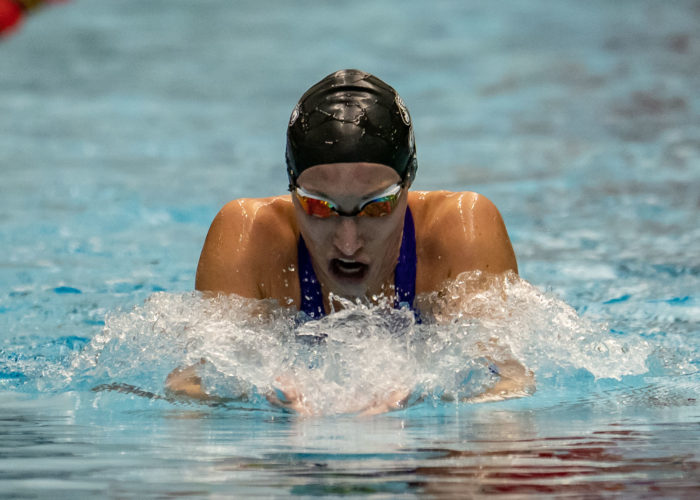
Ally McHugh won two events at the TYR Pro Swim Series. Photo Courtesy: Peter H. Bick
When looking at the favorites for the 400 IM at this summer’s Olympic Trials, many have thrown out names like Melanie Margalis as the frontrunner and rightfully so – she had the top time in the world in 2020 at 4:32.53. Then there is Madisyn Cox and Ella Eastin, who have had their share of hardships the last few years and many fans would want nothing more than to see their dreams come true with an Olympic berth. Then there is U.S. national champ Emma Weyant and Stanford senior Brooke Forde who have been 4:35 in their careers.
But it seems like Ally McHugh always gets lost in the shuffle when mentioning 400 IM favorites. After all, McHugh was the 2018 national champion and reached the final at the 2019 Worlds. This past weekend, McHugh won the 400 IM in 4:41.90, ahead of Weyant, and won the 1500 at 16:12.87. McHugh also competed in all four 200s of stroke (minus the IM), concluding perhaps the most grueling schedule of any swimmer at the meet. That is a testament to her aerobic endurance and her pain tolerance as she chases what would be her first Olympic berth.
McHugh seems to always fly under the radar, dating to her days at Penn State when she won the 2019 NCAA title in the 1650. And this weekend, McHugh definitely made a name for herself as a star in the U.S., even if she has not all the way risen like some of her peers.




